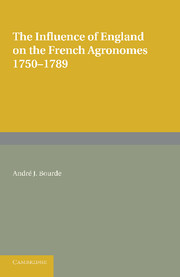Book contents
- Frontmatter
- Contents
- LIST OF ABBREVIATIONS
- Preface
- PART ONE THE PREPARATORY PERIOD 1700–50
- PART TWO DUHAMEL DU MONCEAU'S WORK
- Chapter III The Old French Husbandry
- Chapter IV Tull in France
- Chapter V Controversy on Duhamel's Nouveau Systéme
- PART THREE AGRARIAN REPERCUSSIONS OF THE NOUVEAU SYSTÉME
- PART FOUR HOW THE NEW HUSBANDRY WAS INTENDED TO ENRICH FRENCH AGRICULTURE
- PART FIVE SOME ASPECTS OF THE INTERNAL LIFE OF THE AGRONOMIC MOVEMENT
- Conclusion
- Appendix I
- Appendix II
- Bibliography
- Index
Chapter V - Controversy on Duhamel's Nouveau Systéme
from PART TWO - DUHAMEL DU MONCEAU'S WORK
Published online by Cambridge University Press: 05 June 2016
- Frontmatter
- Contents
- LIST OF ABBREVIATIONS
- Preface
- PART ONE THE PREPARATORY PERIOD 1700–50
- PART TWO DUHAMEL DU MONCEAU'S WORK
- Chapter III The Old French Husbandry
- Chapter IV Tull in France
- Chapter V Controversy on Duhamel's Nouveau Systéme
- PART THREE AGRARIAN REPERCUSSIONS OF THE NOUVEAU SYSTÉME
- PART FOUR HOW THE NEW HUSBANDRY WAS INTENDED TO ENRICH FRENCH AGRICULTURE
- PART FIVE SOME ASPECTS OF THE INTERNAL LIFE OF THE AGRONOMIC MOVEMENT
- Conclusion
- Appendix I
- Appendix II
- Bibliography
- Index
Summary
The new method of Tull and Duhamel had an extraordinary vogue in France. Until the end of the century in such Summae as treatises by Rozier and Tessier, it completely dominates the agricultural question. Wherever corn cultivation is under discussion, even though the writer may sometimes be of a different opinion, the names of Duhamel and Tull appear. The argument was at one time passionate. Books were printed attacking the new theory, others supporting it; on the whole, the ‘new system’ attracted the interest of the agricultural world.
The study of this controversy brings to light a great many shades of opinion. However, whether attacked or supported, the importance of the Tullian system does not lie in its contemporary success, either as pure theory or as a practicable measure. Tull's husbandry was not England's husbandry in the eighteenth century, and it was never that of France, apart from a restricted circle of experimentalists or curieux d'agriculture (agricultural connoisseurs). Its intrinsic agricultural value might be approved or condemned. But even had it never been applied in practice, it would still have great historical significance—just as the theory of Phlogiston has historical value in the study of chemistry. It gave rise, in France, to a lasting discussion featuring prominently in the history of scientific ideas of the eighteenth century.
Another noteworthy thing about it is that it is responsible for the conception of later agricultural works, as much so—if indeed not more—as the physiocratic movement. It is also well worthy of note that the considerable number of volumes, memoirs or articles following Duhamel's treatise, seem to owe their existence only to the interest it evoked. Reactions which followed it were almost exclusively of a scientific nature.
It may seem, and this is an argument often met with, that after all, Duhamel's method is not new; that the whole of his research can be replaced within the general evolution of agricultural technique all over the world. In the remote past, the Chinese had tried to solve the problem of seeding with the help of a special instrument, the Drill. The most complex machinery in modern North America must be but the outcome of a technique striving towards fulfilment throughout history, and in which the endeavours of Tull and Duhamel are but an episode.
- Type
- Chapter
- Information
- Publisher: Cambridge University PressPrint publication year: 2013



